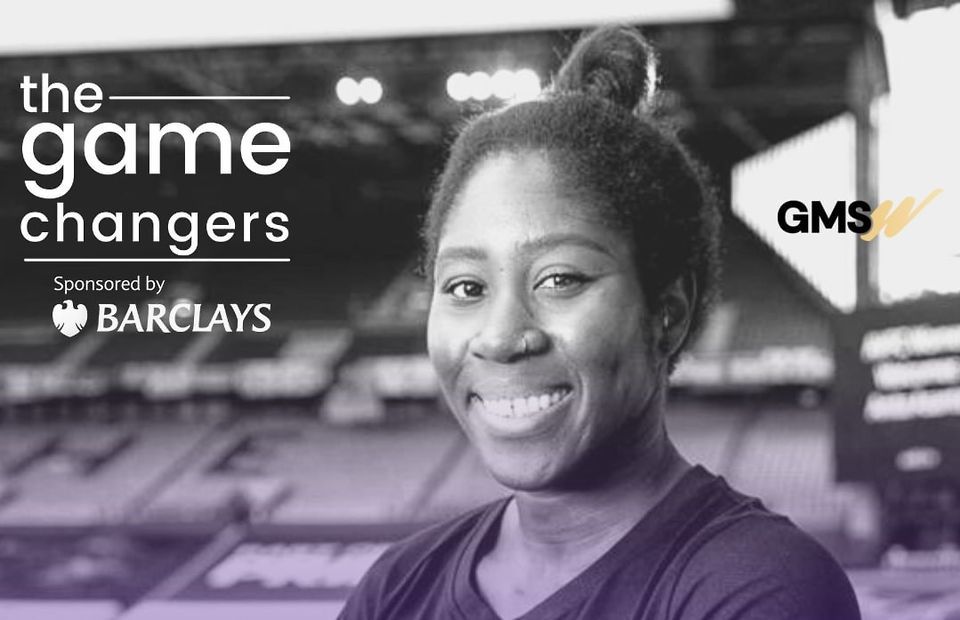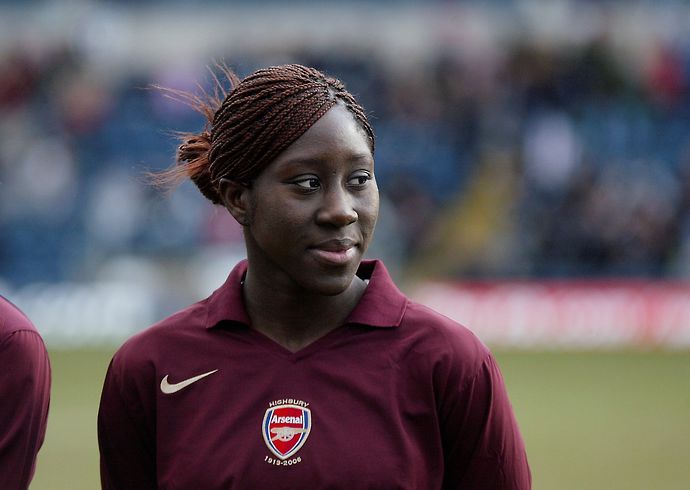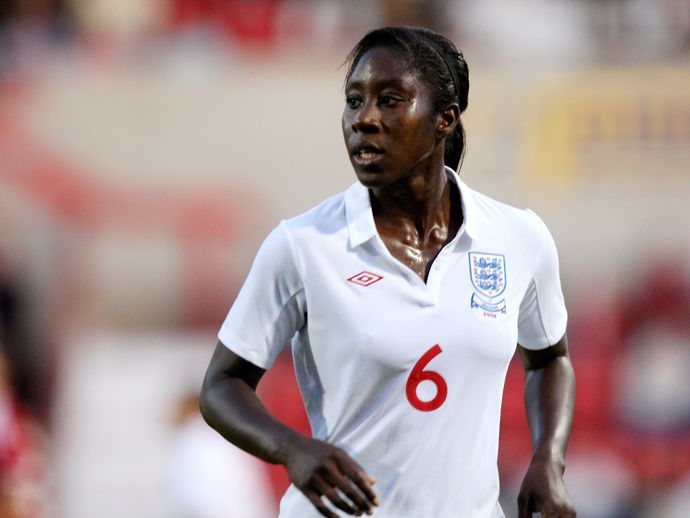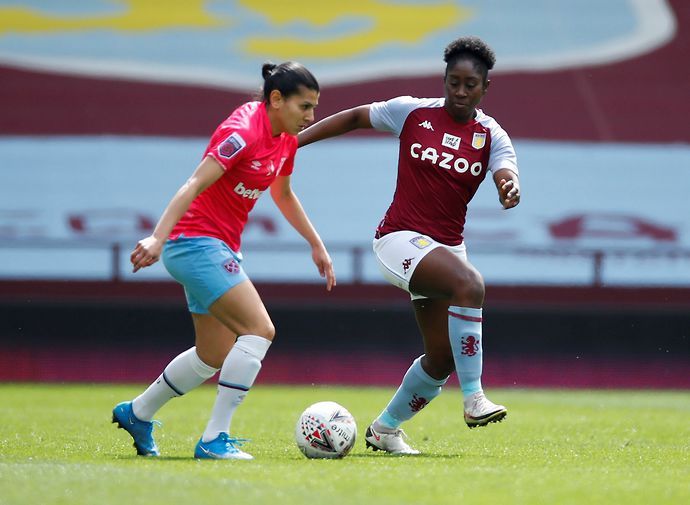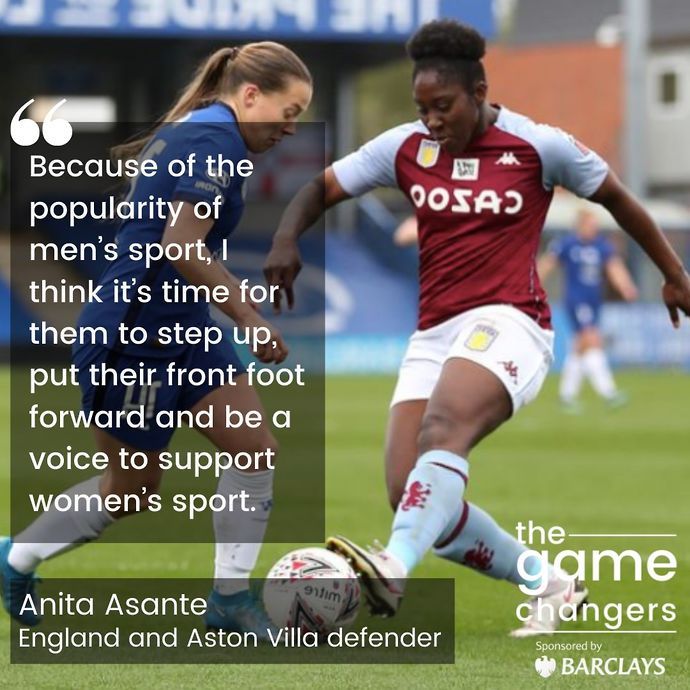This week’s game changers podcast features Anita Asante, the Aston Villa defender who has earned 71 caps for England. In an inspiring interview, Asante discusses using her platform to make sport more inclusive.
Asante began playing football for Arsenal, joining the club as a junior in 1998 and breaking into the senior team in the 2003-04 season. She was part of an accomplished side that won the quadruple in 2006-07, including the Champions League, then known as the UEFA Women’s Cup.
The 36-year-old revealed her parents had been “really supportive” as she rose through the ranks at Arsenal, but she did face some resistance from her grandparents.
“My dad was already a big Arsenal fan,” she said. “So I think that made it easier for them to get behind me and support me. My mum wasn't a massive football fan at the time. And I think when we talk about it now, she would say, it was a great experience for her too, because she learned so much about the game and the people involved.”
Asante continued: “But no, you know, I used to get from my grandparents, who still live in Ghana, more like, you know, ‘Why are you letting her play football? She should be doing other things and preparing for family and the future and that type of thing.’
“But as I've progressed and with my success, I think they've all really, you know, supported me and respected what I've done. And they're really proud as well, which is great, because I've managed to shift, I think, mindsets as well there, from a completely different generation.”
A move from Arsenal to rivals Chelsea came in 2008, before Asante decided to ply her trade in the United States. She played for a number of teams, including Sky Blue, Saint Louis Athletica, Chicago Red Stars and Washington Freedom.
In response to a question about the differences between women’s football in the UK and the US, Asante revealed the players in America had more of a “winning mentality”.
“I think in the UK, we've been used to technical individual players who sometimes show a little spark or something different and unique,” she explained.
And in the US, you're always guaranteed to have a massive pool of talent, who are athletic, who are super fit, who are very highly motivated, winning, they have that winning mentality.
Asante has now become known as an athlete who uses her platform for social good, whether it is speaking out about LGBTQ+ issues, racism or sexism.
“I think being part, myself, with the LGBTQ+ community, I think we're always on that side of having to talk about issues that affect our communities, which impacts me personally and impacts people around me, people I care about,” she said.
“Having the platform that I have, I think it's important that I show up. And that's how I look at it. Like, you know, showing up for those people and myself and making sure that you know, policies and things that affect our society, don't get rolled back, when people have worked so hard to get to this point. And it's no different to women's football.
"It started with pioneers who have led us to this point and they've pushed really hard by being there, being visible, by doing it against all odds. And now it's for the next generations onwards to carry that torch, so that it can't be rolled back.”
Asante then discussed how her race and sexuality had been perceived in the various countries she had played in, including the US and Sweden.
“I think when I played in the US, I didn't really experience anything that was, you know, negative as such or anything like that,” she said. “I felt I was really embraced by my teammates, my club, the franchise, everyone treated me the same.
“I think to some degree we're largely in a bubble as well in our own world, because you don't really, I don't know, live outside of your social networks, so you don't get exposed to everything either, but it was largely a positive experience for me, you know, I loved it. I loved the coming of different cultures together.
“It was the same in Sweden, always had really positive experience with players and the management. I felt at home. I really did feel at home there for the six years I was there. I really enjoyed Scandinavian culture.
Asante continued: “I think the only time I ever experienced something that was a little bit off, was when, and that was in a normal life, like outside of my football environment, just at a cafe and with my teammates. And an older gentleman walked past me and put his hands in my hair, like a complete stranger. Like, I didn't know him...and my teammates looked at me horrified, like what just happened there? And I was like, honestly, I don't know. But yeah, that was the only time that I was just like, ‘oh, you know, that's not really okay’.”
The conversation moved on to the topic of racism in football, which Asante argued has not improved over time.
“I can't really say that it has progressed, in all honesty. Only recently a player gets, I think, a ban, a 10-match ban or whatever it is, or less than that.
And players are getting more significant penalties for betting and gambling and all of that so…so for me, it's like, where are your priorities really?
“Where are you really saying that we have zero tolerance and we really want to stamp it out of the game. In terms of actions, it doesn't really look like that, in my opinion. And I have been critical already in the past about the three-step protocol, because I think if I was in public or you were in public and someone was verbally abusive or physically abusive, would I give them three shots to maybe get it right? I don't think so.
"The onus is still on the victim. And it's always on the victims. Will the player walk off? Should the team walk off? Well, sorry, for me, they're the governing bodies with the power and the policies. It's their game, so govern it."
As the interview came to an end, Asante was asked whether she felt female athletes could have more of an impact than male athletes when speaking out on social issues. There has been a rise of prominent activists in women’s sport, including Naomi Osaka, WNBA players, and Megan Rapinoe.
“Well, I feel like women's sports does have a massive social impact and women are always having this impact, because women are always having to voice up and step up for the things that we're still striving for,” Asante responded.
“So we naturally take on that responsibility for the most part. I actually feel like it's about connecting the two. I feel like men and women's sport needs to come together. We need to have that kind of allyship, that's going to boost it even further, because that's the other half of the population or society that can make the difference.
“Actually, I think because of the popularity of men's sports and the long historical presence it's had, I also think it's time for them to also step up and actually put the front foot forward and be that voice to support it.”
This article was produced in partnership with the game changers podcast, which is supported by Barclays. You can listen to the full episode with Anita Asante here.



















